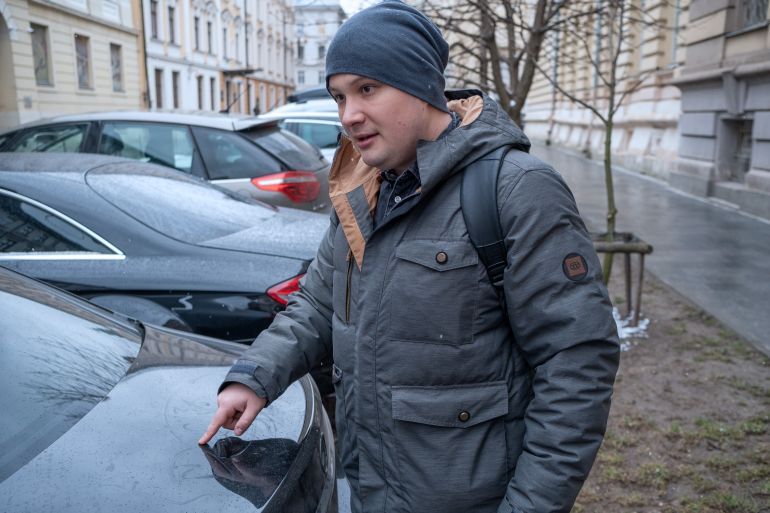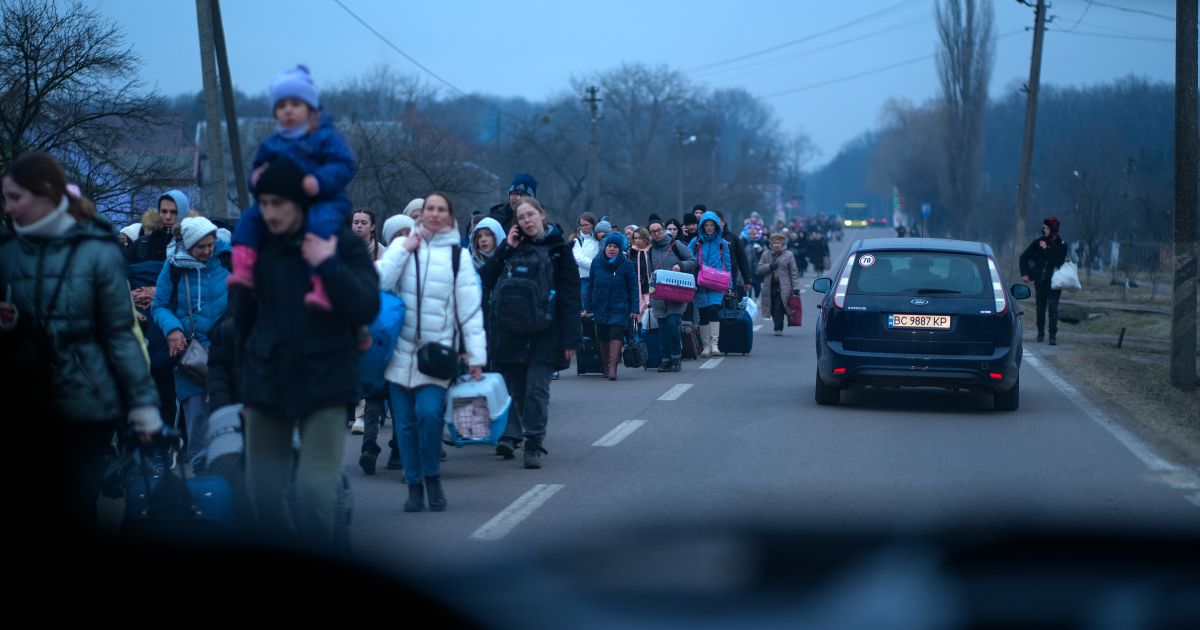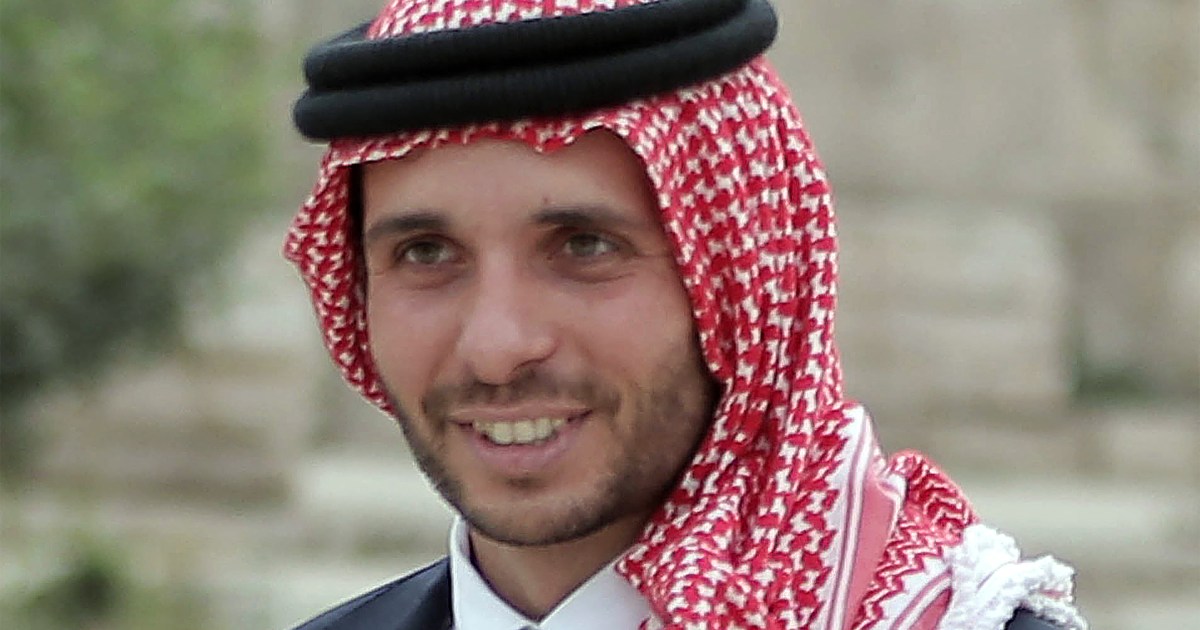Lviv: As refugees flee, a city mobilises for war | Russia-Ukraine war
Anna holds back her tears as she describes how she left her home in the middle of the night with just a few hastily packed suitcases.
Russian forces were within 40km (25 miles) of the southeastern city of Zaporizhzhia and had begun shelling the area.
The 35-year-old leans forward in her chair as she explains: “There were so many explosions, it sounded like it was New Year.”
When intense shelling caused a fire to break out at the Zaporizhzhia nuclear power plant – the largest in Europe – on March 4, Anna’s husband and brother persuaded her to leave the city.
“People were staying in Zaporizhzhia till the last moment,” she says, fiddling with the cord of her hoodie, “but fighting around the nuclear power plant meant it was too dangerous.”
Anna was surprised to discover that trains were still leaving the city, but the station’s platform was packed as hundreds of families attempted to flee. Anna managed to squeeze aboard an overnight train with her mother, mother-in-law and eight-year-old daughter, Zlata. The journey was long, uncomfortable and crowded.
Her husband remained behind to fight the invading forces. She begins to describe the moment she said goodbye to him but stops. The room falls silent. Anna flicks her wrist, indicating that this is a reality still too new – and too raw – to talk about.
A day later, on the afternoon of March 5, they reached the relative safety of Lviv, a city in western Ukraine that has found itself at the crossroads of the country’s refugee exodus.
They have been put up in a spacious room provided by the Jesuit Refugee Service, one of the many humanitarian organisations operating in Lviv these days.
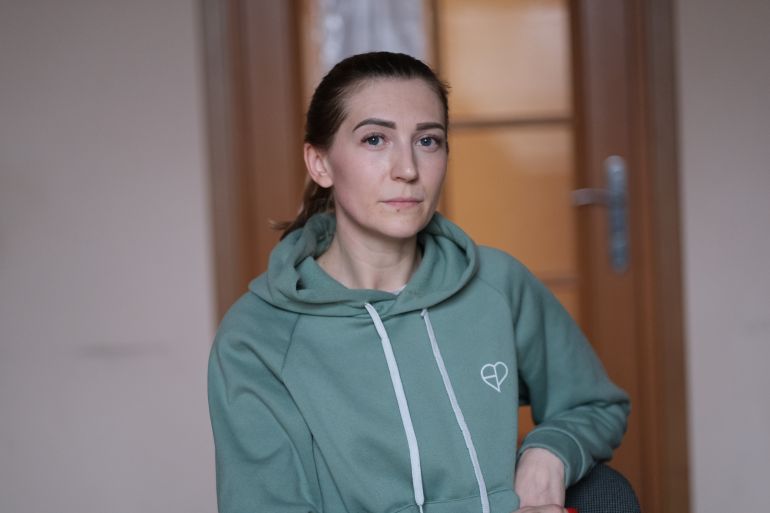
As Anna recalls their journey, her mother, Tatiana, who is sitting on the bottom of a bunk bed, begins to cry. Zlata, who has been resting her head on Tatiana’s shoulder, reaches out and places her palms on her grandmother’s cheeks before whispering something to comfort her.
The four have been wrenched from the security of their home and still appear to be in a state of shock: the atmosphere in the room oscillates between lighthearted laughter and moments of raw anguish and tears.
Anna had enjoyed her job as an electrical engineer, and Zlata, who is confident and composed, had excelled at school, harbouring dreams of becoming an IT programmer. Now, they face an uncertain future, but they plan to stay in the country’s west. “We feel safe here, we don’t want to leave Ukraine,” says Anna resolutely.
The city of Lviv, Ukraine’s sixth largest, had been considered relatively safe compared to other major cities such as Kyiv, Kharkiv and Mariupol which have seen weeks of bombardments and heavy fighting. But on Sunday, a series of missile attacks targeted Ukraine’s Center for International Peacekeeping and Security, located 40km (25 miles) northwest of Lviv, threatening to break the city’s tenuous sense of calm. According to Lviv regional governor Maksym Kozytskyy, 35 people died and 134 were wounded in the attack.
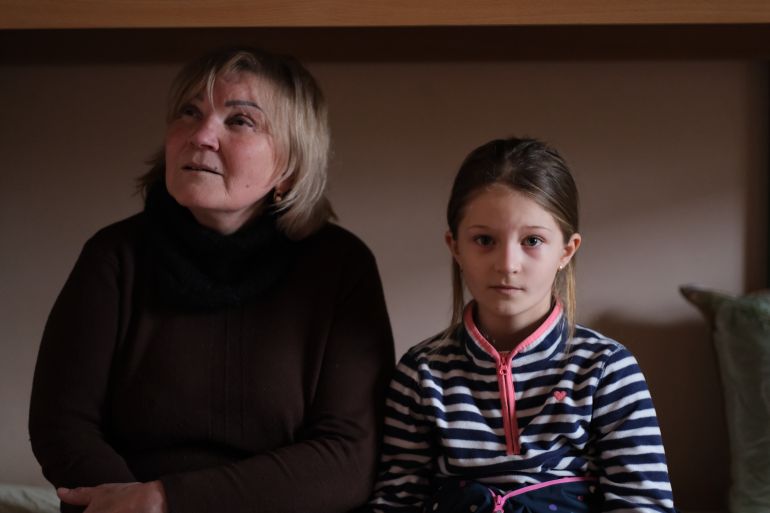
A crossroads
At Lviv’s railway station, in the west of the city, thousands of people gather hoping to board one of the so-called evacuation trains to neighbouring Poland. The station’s grandiose Art Nouveau facade topped by a large glass and steel dome forms a dramatic backdrop to the desperate scenes unfolding outside.
Smoke billows from the many makeshift campfires located in the station’s car park. A steady stream of buses hired by humanitarian organisations pulls up outside the terminal offering free rides to Poland. Food, clothes and medical supplies are unloaded from vans and distributed among those in need. Local volunteers, marked with yellow ribbons, work day and night to control the crowds and stop the situation in the station’s main hall from tipping into chaos.
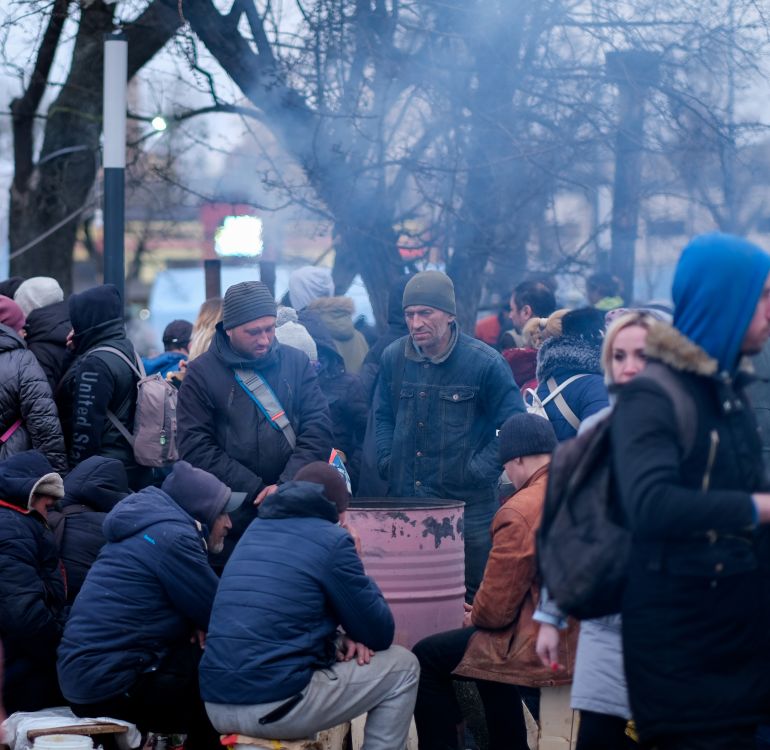
But weaving through the crowds, heavily armed police officers, with their faces partially covered, scan the area for so-called Russian saboteurs, a menacing reminder that this is a country at war. In recent days, the Ukrainian security services have warned local citizens of the presence of Russian spies in the city who, among other things, are said to be marking locations for future Russian bombardments.
The staircase leading up to the platforms forms a chokepoint where the sheer volume of people and their luggage can be overwhelming. Although the numbers of people are regulated by volunteers and police, it is a claustrophobic atmosphere, and the crowds sometimes sway back and forth as people begin to push their way up the stairs with their luggage.
On the platforms, there is more space, as families collect their luggage after disembarking from the east or pack onto trains taking them towards Poland.

Rostyslav, a fresh-faced 19-year-old student with a sensitive disposition, stands on one of the platforms waiting for his mother and two sisters.
They have travelled from Poltava in central Ukraine and are waiting to board a train to Poland. He was particularly frightened by the shelling he heard a few days earlier. “It was really scary,” he says. “I am scared of loud sounds anyway; even if I hear a loud car, I can get scared.”
The Ukrainian government has banned all men aged 18 to 60 from leaving the country in case they are conscripted, meaning that Rostyslav could be separated from his family at the border and forced to stay in Ukraine. “I don’t know if they will let me leave or not,” he says, a trace of nervousness in his voice. “But I will try, and if I can’t, then I will volunteer and do anything I can to help.”
Behind him, a train trundles past, windows covered with condensation, making slow, heavy progress towards the border.
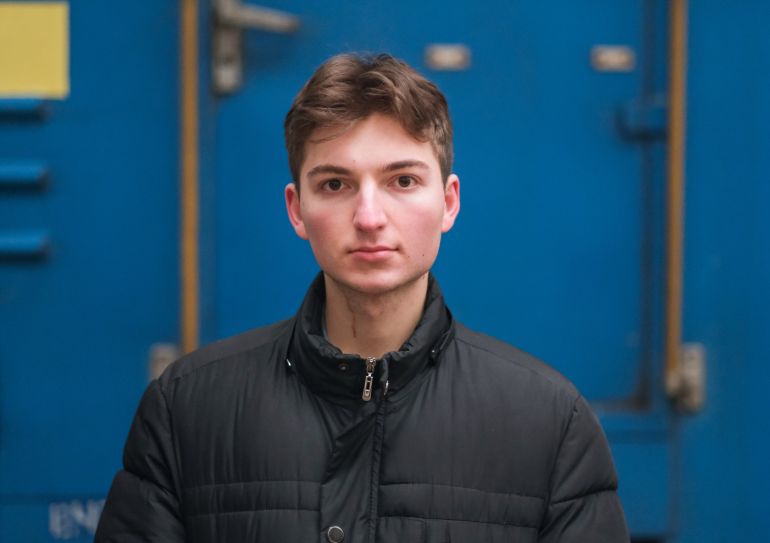
Not everyone is looking to make their way out of the country. Evhen, 40, arrived in Lviv in the late afternoon with his wife and two children – including the family’s 13-month-old baby, who is strapped to him in a sling. A young volunteer hands him a cup of warm porridge for the baby, who is beginning to cry.
The family fled their home near Antonov Airport, just outside of Kyiv, after the area experienced over a week of fighting between Ukrainian and Russian forces. “It was very scary, especially at night,” Evhen says. “There was bombing all the time, so we converted our basement into a bomb shelter.”
At first, he had not been allowed to board the overnight train to Lviv because he was a man, but the police decided to allow him on after seeing he was with two small children.
The train was so full that many people abandoned their luggage on the platform, and Evhen and his family found it difficult to find space for the baby until the conductor allowed them to travel in the staff cabin.
As the train made its way out of the capital, air sirens began to pierce the night sky. The train ground to a halt and switched off all its lights so as not to be a target for Russian bombs. The passengers were made to lie on the ground until the wail of the sirens had passed and the gentle clatter of the train began again as it edged closer to western Ukraine. Evhen recalls how some people were so exhausted by the ordeal of the past few days that they were able to fall asleep on the floor but most stayed awake for the duration of the anxiety-ridden journey.
A day later, the family is in Lviv. But in order to stay together, they must remain in Ukraine, so will travel to the city of Chernivtsi, near the Romanian border, where they will stay with friends.
Then there are others who are heading to fight in the war. Maksym, an easy-going 25-year-old with two and half years of military experience, waits for a train heading to his home city of Dnipro, which was targeted by a series of Russian air strikes on Friday. He has been living in Lviv, but when Russia invaded, he felt a calling to return to the area he is from and volunteer for the army. “I will stay with relatives and then hopefully join my brothers in arms,” he says confidently.

Heading east
Just inside the station’s entrance, flanked by two imposing Tuscan columns, stands a group of British ex-servicemen. They are recent recruits to the International Legion for the Territorial Defense of Ukraine, a collection of foreign volunteers now numbering 20,000, according to Ukrainian foreign minister Dmytro Kuleba.
Ash, an amiable Londoner with experience in military intelligence, decided to sign up to fight after watching a series of videos that documented Russian attacks on civilian areas. He appears relaxed as he waits to board a train to Kyiv, and then on to a location he cannot disclose.
Ben Grant, a former marine now working as a private security contractor in Iraq whose mother is a British MP, decided to sign up after seeing one such video where a child was screaming. “I thought, I am a father of three, and if that was my kids, I know what I would do, I would go and fight. Then I thought I would want another load of people who might be skilled enough to help me, come and help me save my family,” he says. “Yes, I am scared, but I know it’s the right thing, pretty easy decision to make.”
At the border with Poland, 70km (43 miles) from Lviv, people wait for days in a seemingly endless queue of cars to cross into the European Union. The undulating countryside is separated by a series of heavily guarded wire mesh fences and a few hundred metres of no-man’s land that separates Ukraine and Poland.
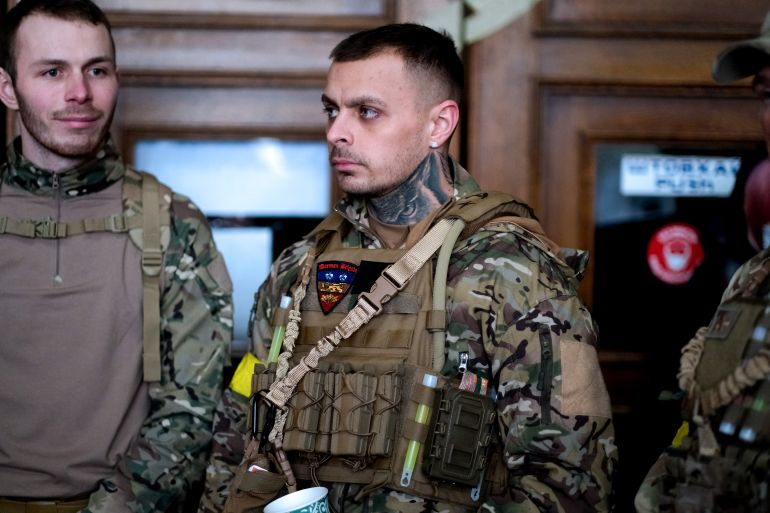
Those who travel by foot face a long walk to the border, but the Ukrainian and Polish border guards now record shorter waiting times. In the initial days following Russia’s full-scale invasion, it would take people on foot days to be processed at the border, but now it can take just a few hours.
Crossing into Ukraine is a much smaller number of people, predominantly humanitarian workers, foreign fighters, and Ukrainians living abroad returning to fight for their country. On March 5, Ukraine’s defence minister, Oleksii Reznikov, tweeted, “66224. That’s how many men returned from abroad at this moment to defend their Country from the horde”.
Michael Turchyn, a high-energy Ukrainian in his 20s who has been living and working in Poland, confidently attempts to stride across the border with two friends. A Polish border officer runs after him, pulling him back and explaining that this is the exit from Ukraine.
Unfazed, Michael turns on his heel and marches past piles of clothes and essentials left for refugees and up the less beaten path towards the entrance to Ukrainian territory. He will return to his hometown of Lviv, where he will train for a week, and join the territorial forces, the volunteer branch of the Ukrainian army. “We must take the chance to defend our country, we just need weapons and food,” he says.
In the scenic Polish city of Kraków, roughly 300km (186 miles) west of Lviv, returning Ukrainians and foreigners looking to head into Ukraine to fight are furiously stocking up on equipment like uniforms, binoculars, knives and gloves at one of the city’s military stores. An exuberant Israeli paramedic with curly red hair and a keen interest in Norse mythology is waiting in a queue to see what is left before she heads to Lviv the next day. She goes by the nickname Moose and was born in Moscow – a fact she says she is now ashamed of. Now, she has decided to travel to Ukraine to “save Ukrainian and Jewish lives”. She says she has never handled a rifle and is not intending to shoot at anyone, but in the event of being attacked by Russian soldiers, she will not hesitate to defend herself.
The Lviv region also plays a crucial role in channelling weaponry from Western countries, including 17,000 anti-tank weapons, such as Javelin missiles, and 2,000 anti-aircraft weapons from NATO and the US to the rest of Ukraine. Russia’s deputy foreign minister, Sergei Ryabkov, issued a warning to NATO on Sunday that these shipments will be viewed as “legitimate targets” for military action as Russian warplanes fired around 30 cruise missiles at a Ukrainian airbase located 20km (12 miles) from the Polish border.

‘Better to be busy than do nothing’
Yulia Laetnyanchyn weaves her way through boxes of canned food. She is calm and composed as a group of young volunteers jostle past her carrying some new deliveries; one of them shows her a list which she approves with a nod of the head and a warm smile. Until two weeks ago, the 39-year-old was a chief operating officer at an IT company based in Lviv. Now, she oversees the city’s primary coordination centre for humanitarian aid located in the Lviv Art Palace.
“It was probably my experience with management that meant I naturally ended up in charge here,” she says. She has been working every day since Russia launched a full-scale invasion but shows little sign of fatigue as she coordinates the constant flow of aid in and out of the centre. “It’s better to be busy than do nothing,” she says.
The building was constructed in 1996 to commemorate the fifth anniversary of Ukrainian independence and designed to host a variety of artistic performances and cultural events.
Twenty-six years later, the 8,700sq m (93,650 square ft) venue is packed with medical supplies, food, clothes and essentials as the country fights to retain its independence from invading Russian forces. In every room, volunteers navigate mountains of aid, sometimes more than three times their height, as police scan the area for suspicious activity. A constant stream of boxes and volunteers arrive at the entrance as security teams struggle to stop the place from becoming overcrowded.
Yulia estimates that more than 400 tonnes of aid have been delivered from the centre to different cities in Ukraine. However, she says, transporting the aid has been a problem after a planned humanitarian corridor to, and from, the besieged city of Mariupol failed to materialise. Russia and Ukraine have blamed each other for violating the ceasefire agreements.
The aid is divided into different sections, with every item listed and registered in an ad-hoc system set up only a few days earlier. Yulia Kanych, a textile artist who is now in charge of coordinating the warm clothing, explains that the work is tiring, but she would not want to be doing anything else. “I will stay and work as long as I need to,” she says.
Oksana Bui is the press officer for the military administration of Lviv, the department temporarily in charge of the city under rules of martial law introduced by the country’s President Volodymyr Zelenskyy when the invasion began on February 24. It makes her proud to come from Lviv when she sees how many local people have mobilised to support the war effort. “I am working 24-7, I am sleeping at the Regional State Administration Building,” she says. “It is improper to do nothing; you have to mobilise. Children are dying in this war, so it is important to encourage action.”
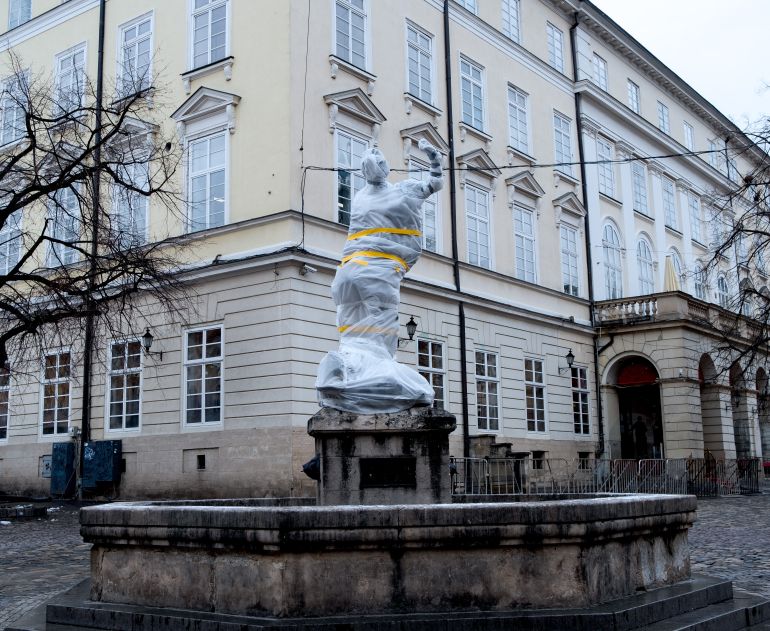
Teachers, young professionals prepare to fight
Lviv may be considered a relative haven from the bitter fighting raging across the country, but there is a growing sense that the city – located at such a strategically important crossroads – will inevitably come under attack from Russian forces, especially after Sunday’s missile attack near the city.
The city is the cultural capital of Ukraine, and the old town is listed as a UNESCO World Heritage Site. But today, many of the city’s restaurants and bars are closed or running at reduced capacity. Historic statues in the city centre, including a 200-year-old limestone depiction of the Roman god Neptune, have been wrapped in protective layers of plastic by concerned locals and conservators as they anticipate future shelling. Russian strikes on airports and a military centre have already been reported in western Ukraine, and air sirens frequently sound across Lviv. Sandbags line the windows and doorways of government buildings.
There is also a palpable sense of suspicion in Lviv. A curfew is in place between 10pm and 6am (20:00 and 04:00 GMT). Anyone caught on the streets during this time without special permission will likely be suspected as a saboteur.
Checkpoints litter the streets, and police regularly pull over cars they deem as potentially suspicious. The punishment for collaborating with the Russians under martial law remains murky – including claims made by Ivan Sopko, the deputy head of the military administration, to Al Jazeera that suspected saboteurs would be shot dead on sight – but an immediate and lengthy prison sentence is a certainty.
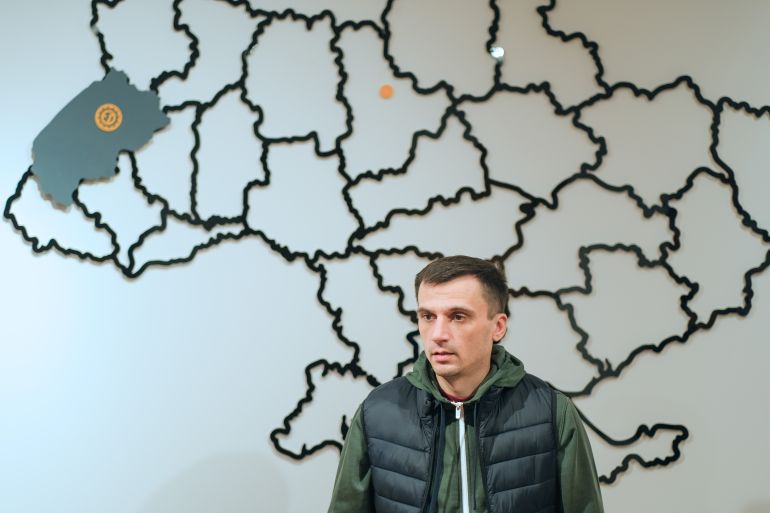
At a Lviv gym, specialists coach young men and women in basic weapons training. Instructors show participants how to hold and fire various weapons and how to stand and crouch in combat scenarios.
Iryna Dankiv, a tall, agile 25-year-old teacher, is proving to be a fast learner. “I used to come here to do yoga, now I am learning to shoot,” she says after handing back the rifle to an instructor. “It’s a bit psychologically scary; I can’t imagine shooting for real.”
Her boyfriend, Oleksandr Popovych, a 25-year-old sports enthusiast who is also a teacher, practices levelling a rifle and staring through the sight. His sleeves are rolled up to reveal a tattoo that reads “peace and harmony” in Japanese.
Dima, a project manager in his 20s, uses the word “unusual” to describe the feeling of holding a rifle. “It feels cold and heavy,” he says.
Nevertheless, he explains that his surprise when he heard the air sirens sound at 5am on February 24 made him realise the importance of being disciplined and prepared for any eventuality.
“We have different waves of mobilisations; currently, it is the first, I am in the fourth wave, but we simply don’t know how much time we would have to prepare,” the military reservist says.
At a restaurant that is doubling up as a makeshift aid warehouse, Oleksandr rejects the offer of a coffee. The ongoing war is already taking a psychological toll on him; “We don’t need coffee,” he says. “We have enough anxiety as it is.” His psychotherapist, who he has been seeing for a year, is now providing free sessions to those who need it. If someone can pay, she donates the money to the Ukrainian army.
He says that the interest in mental health has grown among the younger generation in recent years. “We are evolving from the USSR times, psychotherapy is becoming popular now, people are digging into their problems more,” he explains.
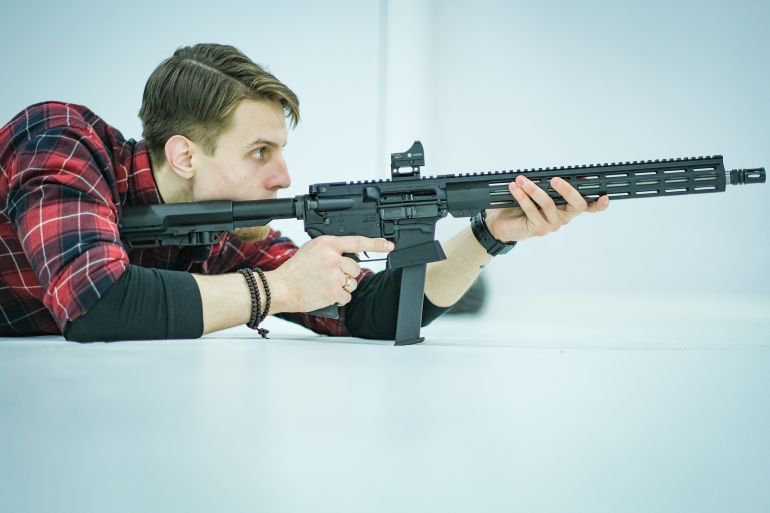
‘We woke up to a new reality’
Iryna describes how it is difficult to stick to a routine, and her sleep is disturbed, sometimes by air-raid sirens and sometimes by anxiety. She is also concerned by the growing likelihood that her boyfriend will join the territorial forces and fight in the war. “As atheists, we don’t think there will be an opportunity to meet again if something happens to him,” she says, her words laced with sorrow as she looks up at her boyfriend, who is walking ahead with a friend.
Ivan Sopko, the straight-talking deputy head of the military administration of Lviv, is certain that the Ukrainian army and territorial forces will be able to defend the city. “We will act without fear; we are in a full state of readiness,” he explains.
Ivan says that the greatest danger to civilians comes from the indiscriminate Russian missile attacks across the country. The Office of the United Nations High Commissioner for Human Rights (OHCHR) has recorded 1,424 civilian casualties in the country. Still, the numbers are believed to be much higher.
“Please tell NATO to close the sky!” he says. “If this is done, then there will be fewer civilian deaths, and we will have a real military conflict; right now, the Russians are just bombing civilians.”
Many civilians in Lviv echo the plea that US and NATO allies impose a no-fly zone to ban all Russian missiles and aircraft from entering Ukrainian airspace. It is a move that the West has previously imposed over Iraq, Libya and Bosnia, but it has so far been ruled out by NATO, which warns that it could result in a”full-fledged war in Europe”.
Ostap Vitiv, a 28-year-old IT specialist who is currently helping refugees with food and transport, says that locals are now more united and determined than ever to protect their country. “One day we woke up to a new reality,” he says as he walks down a cobbled street in Lviv’s old city. “We are fighting for our freedom and future. We are ideologically prepared. It is a huge honour and sacrifice to fight for our land.”
